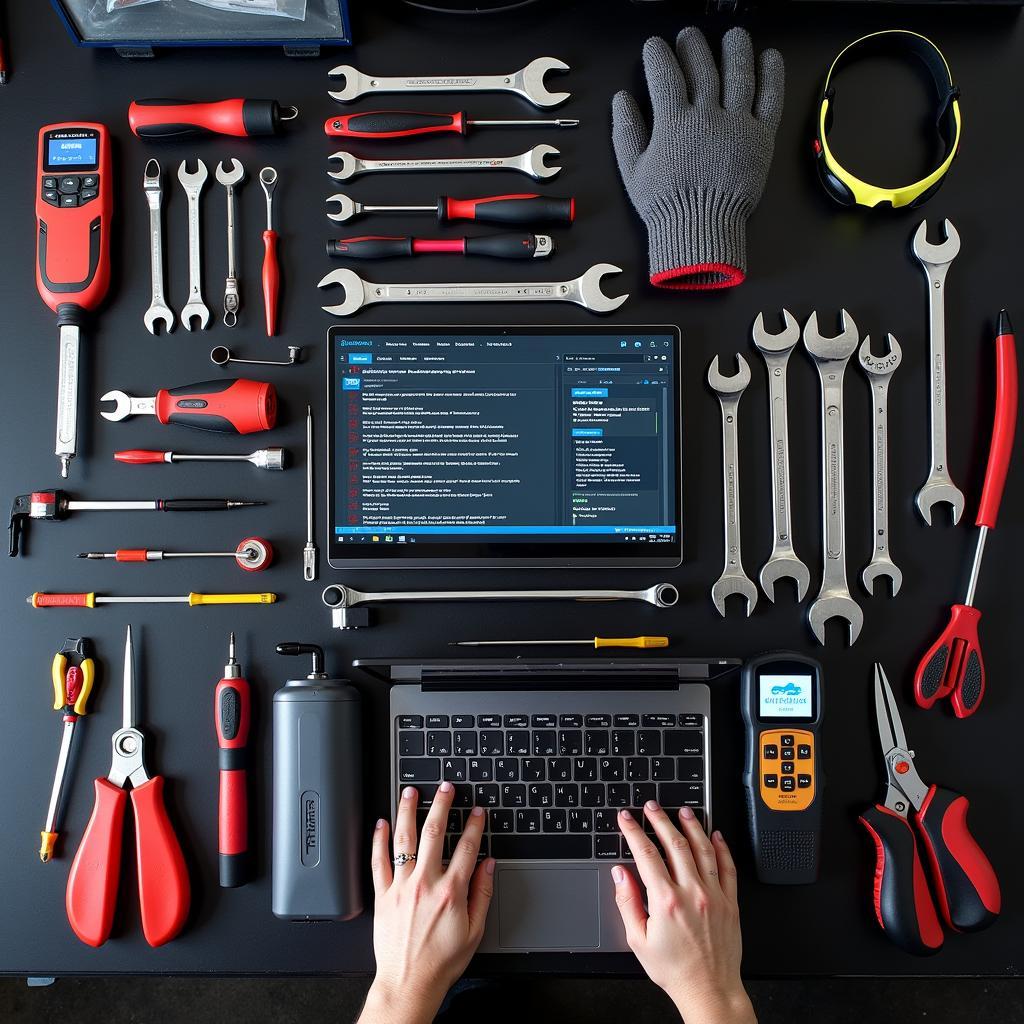A well-stocked career tool belt is crucial for success in the automotive industry. Whether you’re a seasoned mechanic or just starting out, having the right combination of tools and skills will determine your effectiveness and career trajectory. This article will explore the essential components of a comprehensive career tool belt for automotive professionals, covering everything from physical tools to the indispensable soft skills needed to thrive in this dynamic field.
 Essential Tools for an Automotive Career
Essential Tools for an Automotive Career
Physical Tools: The Foundation of Your Career Tool Belt
Every automotive professional needs a core set of physical tools. This includes wrenches, sockets, screwdrivers, pliers, and hammers, forming the backbone of any mechanical work. These tools are your hands-on partners, enabling you to tackle various tasks from basic maintenance to complex repairs. Investing in high-quality tools is a worthwhile investment in your career. Remember, reliable tools translate to efficient work and fewer frustrations.
What tools do you need for Toyota cars? Check out our helpful guide.
Specialized Tools: Expanding Your Capabilities
As you progress in your automotive career, specialized tools become increasingly important. These tools cater to specific tasks and vehicle makes. Diagnostic scanners, for example, are essential for identifying and troubleshooting electronic issues in modern vehicles. Similarly, specialized tools for European car engine tools are often necessary when working with specific European makes and models. Having the right specialized tools allows you to expand your service offerings and cater to a wider range of vehicles.
Soft Skills: The Unsung Heroes of Your Automotive Career Tool Belt
Beyond the tangible tools, soft skills are equally vital components of your automotive career tool belt. Effective communication is key to understanding customer needs and explaining complex technical issues in a clear, concise manner. Problem-solving skills are paramount in diagnosing and fixing vehicle malfunctions. A strong work ethic, attention to detail, and a commitment to lifelong learning are essential for staying ahead in this ever-evolving industry.
The Importance of Adaptability and Continuous Learning
The automotive industry is constantly evolving with new technologies and vehicle systems emerging regularly. This makes adaptability and continuous learning critical for long-term success. Staying updated on the latest industry trends and advancements ensures you remain competitive and relevant. Consider pursuing certifications and attending workshops to enhance your skillset and expand your knowledge base.
“In today’s automotive landscape, continuous learning isn’t just an advantage; it’s a necessity. The industry is evolving so rapidly that stagnation equals career suicide.” – Dr. Amelia Vargas, Automotive Engineering Professor, MIT.
Building Your Digital Toolkit
In today’s digital age, a digital toolkit is just as crucial as your physical one. This includes software for diagnostics, repair manuals, online forums, and educational resources. These digital tools provide access to a wealth of information and support, enabling you to stay informed and tackle challenges effectively.
If you’re interested in car painting machine tools, be sure to check out our dedicated article.
Leveraging Technology for Enhanced Efficiency
Technology plays a pivotal role in modern automotive repair. Diagnostic software and online resources empower technicians with the information needed to quickly and accurately diagnose issues. Embrace these tools to enhance your efficiency and improve the quality of your work.
“A well-rounded automotive professional doesn’t just rely on wrenches and screwdrivers anymore. They leverage digital tools to amplify their capabilities and deliver superior service.” – John Miller, Master Mechanic and Automotive Consultant.
Even tools designed for escaping cars in emergencies are becoming more advanced. Learn more about the Stinger super duty car emergency escape tool.
Conclusion: Investing in Your Automotive Career Tool Belt
Building a comprehensive career tool belt is a continuous process. It requires a commitment to acquiring both physical tools and honing your soft skills. By investing in your tool belt, you invest in your career, ensuring you’re equipped to thrive in the dynamic and challenging world of automotive repair. Keep learning, adapt to change, and never stop refining your skillset. A strong career tool belt is your key to unlocking success in the automotive industry.
FAQ
- What are the most essential hand tools for an automotive career?
- How important are diagnostic scanners in modern automotive repair?
- What are some key soft skills needed for success in the automotive industry?
- How can I stay updated on the latest automotive technologies and trends?
- Why is continuous learning important in the automotive field?
- What digital resources are helpful for automotive professionals?
- How can I build a strong automotive career tool belt?
For further support, don’t hesitate to contact us via WhatsApp: +1(641)206-8880, Email: [email protected], or visit us at 910 Cedar Lane, Chicago, IL 60605, USA. Our customer service team is available 24/7.